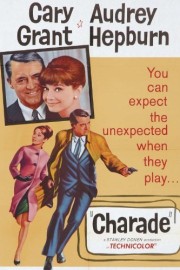Charade
“Charade” is the greatest Hitchcock film never made. Well, never made by Hitchcock, at least. For a long time, it was a common misconception that Alfred Hitchcock had directed this romantic thriller with Cary Grant and Audrey Hepburn. While that would seem to be a disservice to the actual director of this film, Stanley Donen (a legend in his own right after classics like “Singin’ in the Rain,” “Funny Face,” and “Seven Brides for Seven Brothers”), it’s actually a compliment, since many have tried– and failed –to replicate the Master of Suspense’s style over the years. That Donan succeeded so brilliantly in quite an accomplishment.
A big part of “Charade’s” success is not just Donen’s direction, but the screenplay by Peter Stone, who captured the essence of Hitchcock’s narrative style effortlessly. The film stars Hepburn as Regina Lampert, an American who is talking about divorcing her husband while on vacation in Europe. When she gets back to her home in Paris, she finds it cleared out, and her husband in the morgue. It’s not long until she finds out some unexpected truths about her husband, and she’s being chased down by three crooks (James Coburn, George Kennedy, and Ned Glass) who are trying to get back $250,000 they were owed by the dead man. It’s around this time when Regina meets a mysterious man (Cary Grant) who appears to be a friend, but could have an agenda all his own.
As much as this film resembles a Hitchcock movie in structure and theme, in tone, it’s a very different beast than anything the Master came up with. Fitting given Donen’s familiarity with musicals, “Charade” has a much lighter, more comedic tone than Hitchcock’s work. Especially with the natural timing between Grant and Hepburn, Stone’s script snaps, crackles and pops with the witty back-and-forth of a Doris Day and Rock Hudson romantic comedy. Mixing that vibe with the sly twists and turns of Hitchcock feels like a match made in heaven, and Donen and Stone are naturals at the combination, which is especially helpful when the story gets convoluted not only by the lack of certainty about where Regina’s husband hid the money, but also by the lack of identity in Grant’s character, who goes through a few different aliases in his first two days of interaction with Reggie. Hepburn and Grant have great chemistry together– comparable to that which Grant had with her mother, Katherine — which isn’t surprising given their respective stardom at the time, even if Audrey was still in her prime, while Grant was near the end of his run. (Yeah, there was some flack about Grant wooing Hepburn given the 25-year difference between the two, but that’s always been the case when older men are paired with younger women. Besides, it doesn’t affect the success of the film one bit.)
The tone isn’t the only place where “Charade” diverts from the Hitchcock formula, however. While Hitchcock took particular care with his female characters, by and large, they were supporting characters to his male protagonists, especially those played by Grant (“North By Northwest,” “Notorious”) and Jimmy Stewart (“Vertigo,” “Rear Window”). Here, Hepburn’s Reggie is front and center; it’s her attempts to learn the truth that drive the story. She isn’t a pretty romantic foil like Grace Kelly, or a fragile leading lady like Kim Novak or Tippi Hedren; like her character in 1967’s “Wait Until Dark,” Hepburn’s character is strong and independent, and only as fragile as the story requires. When she’s needed to take control of the narrative, she’s more than capable of doing so. The only female character I can think of in Hitchcock’s movies that comes close to Reggie is Ingrid Bergman’s psychiatrist in “Spellbound,” although Novak’s character in the second half of “Vertigo” shows off some of Hepburn’s strength as well. On this front, “Charade” is well ahead of just about every Hitchcock film, and yes, I’m including some of the masterpieces as well.
Part of the reason for my timing with this review is that it’s my mother’s birthday today. “Charade” is one of her favorite films, along with another Cary Grant classic thriller (“North By Northwest”) and one of those Doris Day/Rock Hudson comedies I was mentioning earlier (“Pillow Talk”); “Wait Until Dark,” with Audrey Hepburn, is on that list as well. Watching it myself for the first time in a great, many years, I found that I remembered a lot of the narrative twists before they happened, and that the movie remains one of the great entertainments of all-time. I can see why she loves it so much.










